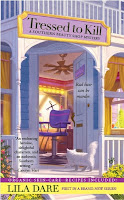 Susan: I’m very happy to have KD Easley join us today. She’s a fellow Missouri author and a super nice lady. She’s also giving away a signed ARC of MURDER AT TIMBER BRIDGE to one of today’s commenters! So comment away!
Susan: I’m very happy to have KD Easley join us today. She’s a fellow Missouri author and a super nice lady. She’s also giving away a signed ARC of MURDER AT TIMBER BRIDGE to one of today’s commenters! So comment away!
Hi, KD and welcome to the Stiletto Gang! First off, tell us about MURDER AT TIMBER BRIDGE (A Randi Black Mystery) and how you came to write it.
KD: I think Randi developed out of dreams of what I always wanted. I was in a pretty rough time in my life when I wrote MURDER AT TIMBER BRIDGE, and I think it was escape more than anything. Randi has twin boys and I always dreamed of having twins. Her kids are pretty well-behaved and I always dreamed of having well-behaved children. And, Randi has two brothers, one of them older. As an only child, I’d always dreamed of having an older brother. I mean, when you’re dreaming, why not pick the one thing that you’re absolutely never going to have, right? Anyway, writing Randi’s story gave me a chance to have some of the things I’d always wanted, without dealing with the crappy things going on in my life. I mean seriously, tripping over a dead body is worse than almost all of the crappy jobs I’d had up to that time, so it even helped me feel positive about my own life.
Susan: Is Randi anything like you? How is she the same/different?
KD: Randi and I share a sense of humor, we’re both divorced, and we both have two sons. She lives in a small town where everyone knows everything about everyone else, and we share that experience as well. I think we differ in that Randi is a bit more social than I am. She has more friends and a bigger family. She’s also probably not as shy, more apt to jump into trouble without thinking, and she has much longer hair. Truth to tell, she’s probably about forty pounds lighter than I am too, but we can just keep that among ourselves.
Susan: What inspired you to start writing mysteries?
KD: I’m a lifelong mystery reader, starting with Nancy Drew and Trixie Belden and moving up from there. I’m a storyteller from early childhood and had numerous imaginary friends. My Mom used to say that, when I went in to take my bath, it sounded like there were twenty people in the room with me. I can remember very clearly that some of my imaginary buddies were good guys and some were bad guys. So even though I don’t remember any specific stories from those days, I think I was probably honing my mystery chops even back then. The trigger that actually put my butt in the chair and my fingers on the keyboard was the death of my best friend. The story I wrote was more romance and autobiography than anything else, and if I’m lucky, no one will ever read it. The writing was awful and it had a sad ending (and as everyone knows, romance fans do not want sad endings); but it was very cathartic, and it gave me a chance to see how words worked on paper. I learned more from that failed manuscript than anything else I’ve ever done. Shortly after that I started writing TIMBER BRIDGE, bodies started dropping and I knew I’d found my home.
Susan: How do you balance your real-life and your publishing life? Any tips on juggling it all without going crazy?
KD: I don’t balance them at all. I’m a bit compulsive and whatever I’m doing at the moment is the most important thing in the world, whether it’s baking Christmas cookies, writing, or working in the yard. So balance is something I really struggle with. I think the going crazy part is a given. You have to be a little bit crazy to write. I seriously need to learn some time management and organizational skills. It would make my life so much easier. That may perhaps be another one of those unobtainable dreams, like the big brother thing I mentioned earlier.
Susan: What authors/books do you most love reading?
KD: I love to read. It’s an addiction for me. If I don’t have a book or my Kindle handy, I’ll read the back of cereal boxes. I get a physical ache when I go without reading for too long. To that end I will read almost anything, but my first love is mysteries and thrillers. I love Dick Francis. He has the ability to draw you into his story with an opening line and hold you there till the end. But I also read Dana Cameron, Carolyn Haines, Lee Child, Dana Stabenow, Jim Butcher, Robert Parker, this list could truly go on and on. I don’t really have a specific type of mystery. I love them all: cozies, police procedurals, amateur sleuth, romantic suspense, female protagonists, male protagonists, wizards, or vampires. I also find that I’m enjoying some of the women’s fiction that’s come out in the last few years. And I love to revisit old series. I find when I’m editing, I tend to read my old favorites and stay away from the tasty new books out there. I don’t know if it’s to keep my mind fresh for my own work, or to make it easier for me to put the book down and actually get some work done. I imagine it’s the latter.
Susan: What’s next for you?
KD: I’m working on book two in the Randi Black series, MURDER AT THE JOLLY ROGER. It’s due out in June of next year, and I’m winding up the edits on it now. My stand-alone mystery, WHERE THE DREAMS END, came out last year and lots of readers have asked to revisit those characters, so I’m working on a new story for Brocs Harley. I’m also putting together an anthology called ONCOLOGY CAN BE MURDER to raise money for the American Cancer Society. I hope to have enough stories gathered for that to see it published next year. I’ve got some short stories in the works as they seem to help me clear my head when the work in progress isn’t going well. I may try to send a few of those out and about and see what happens. And, between writing projects, I’m putting a book tour together for this summer and promoting, MURDER AT TIMBER BRIDGE and WHERE THE DREAMS END. Oh, and cooking and cleaning and all those other dreary chores that get in the way of the fun stuff. Wow, I’m tired just writing all that.
Susan: How can readers get your books?
KD: My books are available by request at any brick and mortar bookstore, or online at Amazon, BN.com, and most other Internet booksellers. Electronic copies are available from http://www.smashwords.com/ and Kindle, and signed copies can be purchased from the store page of http://www.kdwrites.com/. Thank you so much for inviting me to visit the Stiletto Gang! It was a blast!
KD Easley can be found procrastinating in Missouri with her two feline co-writers, Luna and Merlin. Signed copies of her books are available at http://www.kdwrites.com/ and KD can be found periodically at http://kdblog.kdwrites.com.
 Not too far into the story I realized it was set in the world I had imagined resulting from the runaway altered bacteria. In my story, the oil-eating bacteria had mutated and spread after being set loose on a massive oil spill; they consumed not only all oil in the world, but all petroleum products, including plastics and the fail-safe seals on germ warfare experiments, releasing deadly plagues. The novel is about competition by several groups of people for control of this dangerous, nearly depopulated world. Zach, the good man from my dream, became one of the three main characters; the two other key characters, who appeared to me when I began writing, are The Principal, a well-meaning but flawed political and military leader, and Evvy, the young girl that both men love, who may hold the key to saving the world.
Not too far into the story I realized it was set in the world I had imagined resulting from the runaway altered bacteria. In my story, the oil-eating bacteria had mutated and spread after being set loose on a massive oil spill; they consumed not only all oil in the world, but all petroleum products, including plastics and the fail-safe seals on germ warfare experiments, releasing deadly plagues. The novel is about competition by several groups of people for control of this dangerous, nearly depopulated world. Zach, the good man from my dream, became one of the three main characters; the two other key characters, who appeared to me when I began writing, are The Principal, a well-meaning but flawed political and military leader, and Evvy, the young girl that both men love, who may hold the key to saving the world.












